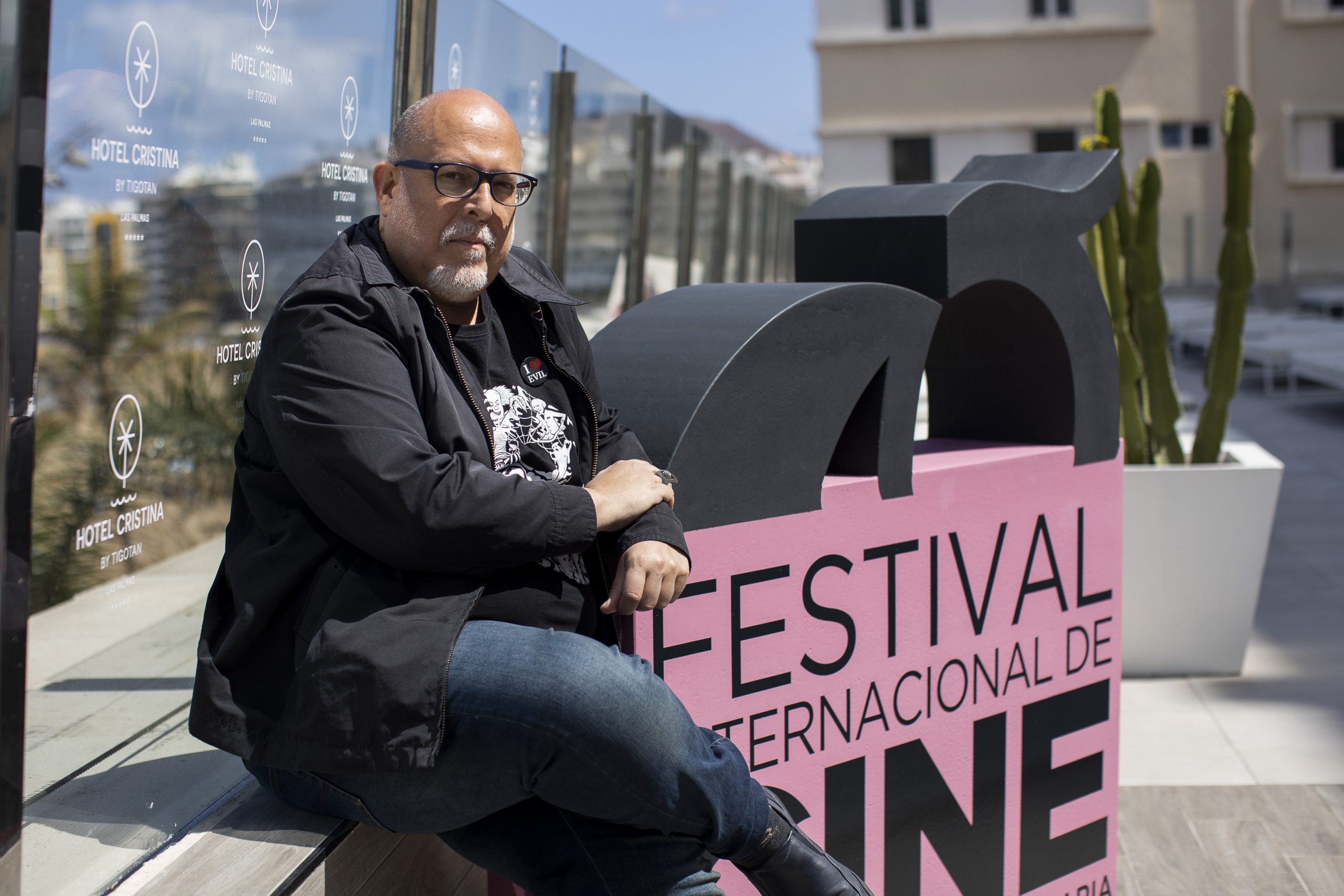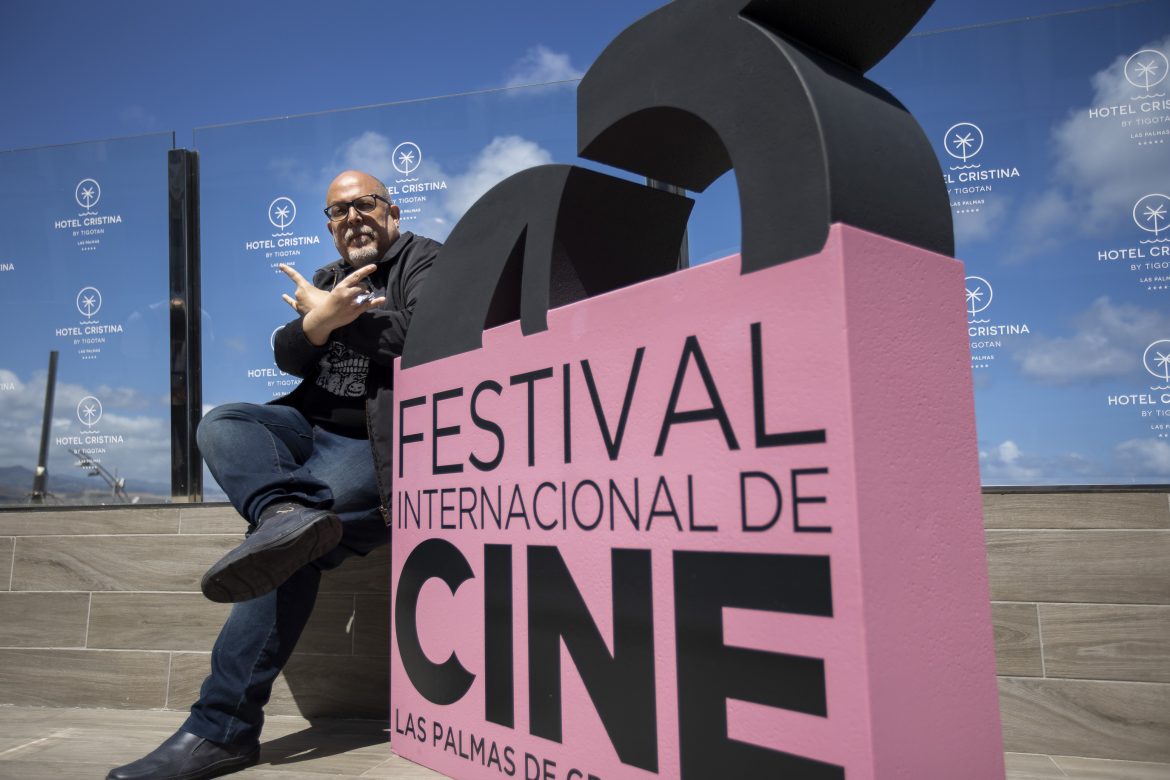➢ The Freakiest Night’s programmer talks in advance about two genre evenings dominated by Spanish productions: on Friday 29 and on Saturday 30 (10 p.m.), at Cinesa El Muelle
➢ The short films The Amazing Vaccine of Doctor Dickinson and My Name Is Koji, as well as the feature films Ghosts of the Ozarks and Everyone Will Burn make up a section that “has become a hallmark of this Festival for a while now,” according to Palacios
➢ The author and film critic pointed out the pandemic’s double impact on the “freak” industry: more independent productions and a greater influence on the topics
➢ “I miss more presence of genre cinema at events like the Goya Awards: there’s been a setback in regards to what we’d advanced over the last few years”

Las Palmas de Gran Canaria 27/04/22. 21º Las Palmas de Gran Canaria International Film Festival. The Freakiest Night. Jesús Palacios presents this edition’s program. Picture by Quique Curbelo
Las Palmas de Gran Canaria, Wednesday 27 April 2022.- Jesús Palacios is a well-known and recognized writer with a deep knowledge of the fantastic and horror genre. And he is also The Freakiest Night’s programmer, which, as he emphasized, “has become a hallmark of this Festival for a while now.” Palacios expects the freak audience to still be attracted to this double night, until in next editions “we recover those night marathons that have always inspired our philosophy and that, because we didn’t know what would happen, we couldn’t plan this year.”
The author also reflected on the pandemic’s impact on the cinema he likes so much, bringing about more modest productions and, especially going forward, “more films about viruses as well as about how societies and countries have turned dystopias into a reality.” He demands higher recognition for genre cinema, too: “That tendency to make more educational, social films, with even an ideological and political component, has being detrimental for us,” he regretted, “we’ve gone backwards in regards to what we had already achieved, and it isn’t fair, I think there’s enough room for everyone.”
The Freakiest Night’s double program
In this 2022 The Freakiest Night will have a double session, since its program has been divided in two evenings at Cinesa El Muelle (always at 10 p.m.). It includes three Spanish productions and an American one, rural and historical horror, a vintage touch and a lot of black humor. It couldn’t be otherwise, given Palacios’s own preferences.
The Freakiest Night will begin on Friday 29 with the short film The Amazing Vaccine of Doctor Dickinson, “which has a lot to do with these pandemic times: a rather sardonic take by Alex Rey on the impact of covid,” specifies the programmer of the section. “Alex has made everything: is an animated short film in which he even dubs the characters. It displays very typical Spanish humor, much like Muchachada Nui, I think it is very good.”
Next, the second screening will be Matt Glass and Jordan Wayne Long’s feature film Ghosts of the Ozarks, a title that’ll be release for the first time in Spain thanks to the Festival. Both filmmakers are, according to Palacios, “exponents of the current American independent horror cinema. A true independent cinema, in this case it is not a mere label.”
About the film itself, set in the Ozarks, an Apalaches’ mountain range, he said that “it takes place in the deepest America, in which we could define as what it’s now called a Weird Western. A ghost story set in a completely isolated community in the West in the middle of the 19th century. They live in peace, but also because they’re hiding a very strange and dangerous secret.” Trying to not reveal much more, he encouraged to pay attention to “a fantastic moment halfway through the movie, in which the main characters perform an absolutely impressive musical solo.”
The short film My Name Is Koji, by David Muñoz, will be screened on Saturday 30. It is “a tribute to Mazinger Z. A very affectionate take on the original series, and with a very droll humor.”
And Everyone Will Burn will close the program: David Hebrero’s second feature film. “It’s been at Sitges and Isla Calavera: an authentic freaky piece,” claimed Palacios. “It’s surrealist and strange, a sort of David Lynch in a Leonese village isolated from everyone and everything. In the beginning it’s closer to the concept of Aléx de la Iglesia’s tv series 30 Coins, but it immediately finds its own peculiar way, with lots of black humor.” Besides, he added, “it stars Macarena Gómez, who is flawless as a hysterical character that I think will make history. In my opinion, she’ll win this year’s Goya for Best Actress: mind you, the Goya from his darkest paintings.”
A freak-flavor festival
Jesús Palacios trusts that “little by little we are able to come back to our old formula, to marathons. This year, so far,” he pointed out, “the festival has a very freak symbol floating around at all times, which is Nosferatu. The original film is now a hundred years old, but that is nothing for a vampire… There’s also Lucile Hadzihalilovic’s retrospective. Within that context we keep having our especially freak spot, which has also been one of this Festival’s hallmarks from the very beginning.”
Rural horror
In a more extensive reflection on the genre and its current state, Palacios claimed that “there’s a current trend of rural horror, in contrast with urban environments. Which is something we urbanites fear a lot. This rural cinema is also more accessible for independent productions, from a pragmatic standpoint. On the other hand, I think this tells us something about our society’s current state, the menace we consciously or unconsciously see in that disappearing world.”
The pandemic’s impact
Asked about the impact of covid on genre cinema, Jesús Palacios said that “in general, the way we do or make things is always changing, although it’s true that the pandemic has impacted us in two different ways: on one hand, when it comes to focusing on smaller, almost home-made productions; and then, on the other hand, it is also influencing the stories. We’ve been shocked by the fact that those films from the 80s and 90s, or even more recent ones like Contagion (Steven Soderbergh, 2011), have gone in our figurative video clubs from the fantastic and horror section to the drama and reality one.”
Even though the health crisis “hasn’t had an evident impact yet. But it’s already happening. We’re going to see quite a few films about viruses and pandemics, and how countries have reacted to it, making dystopias a reality. We’re going to see a lot of fantastic and horror cinema with that touch. What remains to be seen is,” the writer wondered, “if the pre-pandemic production levels will be recovered. And also in the productions made directly for the platforms, with everything that means in terms of creating longer stories.”
Genre vindication
“I’d like to highlight the absence of fantastic and genre films in awards as important as the Goya,” emphasized the author in his vindication of genre productions. “That tendency towards promoting social films, which spread more or less clear messages about how things should be, is having an influence as well on making less genre cinema. I think there’s enough room for everything: a national cinematography’s good health condition is not exhibited or defined by a single kind of cinema. It’s necessary that other films exist, too.”
In this respect, Palacios admitted that “it’s true there’s people making a lot of effort to get their works off the ground, which by the way also tackle important topics, although from a freak standpoint and with a great sense of humor.” But he stressed that “there’s been a kind of setback in relation to what we’d already won in that sense.”
“Fantastic and horror cinema,” added the author of books such as Psychokillers (1998), Nosotros los vampiros (2002) [We the vampires] or Hollywood maldito (2014) [Cursed Hollywood], “forces the audience to reflect and interpret films without telling them what’s right or that this is what they have to do. Fantastic cinema is characterized by the freedom it gives the audience to interpret what’s happening on-screen. In this regard, I’d like to use this opportunity as well to vindicate pure-entertainment movies, escapist movies: not everything needs to be transcendent or about the human condition. We have the right to escape it, too. I need that kind of cinema as much as I need to breath.”
Palacios explained that “there’s a rise in films dealing with topics that seem to worry everybody. It’s even noticeable in superhero or horror movies. In Hollywood,” he noted, “they keep making genre movies because they keep making all sorts of movies, in general. But when a country’s cinema industry level or its tradition are smaller, other kinds of cinemas suffer the most. I think that’s the case in Spain. Just when it was establishing itself in our film production,” he regretted, “this tendency towards a more human, social or even political cinema has come, and I think has made things worse. Action, detective, horror or fantastic productions are becoming less and less important than that social or ideological cinema, which in no way I’m saying shouldn’t be made. I repeat that there should be enough room for everyone.”
Nosferatu, el libro del centenario [the book of the centenary]
Jesús Palacios has had a long career as a literary author, with nearly twenty works that dealing with topics related to fantasy, horror or genre cinema. A recognized specialist and freak, he’s just published his latest work, Nosferatu, el libro del centenario (Notorious, 2022). Precisely about an icon extremely present in the posters of the 2022 Las Palmas de Gran Canaria International Film Festival.
The author tackles F.W. Murnau’s original film in order to elaborate on a meticulous analysis about the centenary film and its black legend, its ins and outs, its reminiscences and the influences it has left as its legacy.
The Las Palmas de Gran Canaria International Film Festival, organized by the Culture area of the Gran-Canarian capital’s City Council through Promoción de la Ciudad de Las Palmas de Gran Canaria, has received public assistance by the ICAA [Institute of Cinematography and Audiovisual Arts] and the program for the internationalization of Spanish culture, PICE Visitantes, of Acción Cultural Española (AC/E).
Among the Festival’s collaborators we may find Cinesa El Muelle, El Muelle Shopping Center, Hotel Cristina by Tigotan, the Elder Museum of Science and Technology or Casa África, places which also function as seats or hold activities; as well as other institutions and companies such as Audiovisuales Canarias, Music Library & SFX or the International Bach Festival. Likewise, its market, MECAS, has been possible thanks to the sponsorship of the Gran Canaria Film Commission-Sociedad de Promoción Económica de Gran Canaria and the support of Canary Islands Film and Proexca.
The University of Las Palmas de Gran Canaria, the Mid Atlantic University, the Audiovisual Cluster of the Canary Islands, CIMA Canarias, the Asociación Microclima Cineastas de Canarias [Association of Filmmakers of the Canary Islands ‘Microclima’] and Repeople are also collaborators of the Festival.
Share this Post

